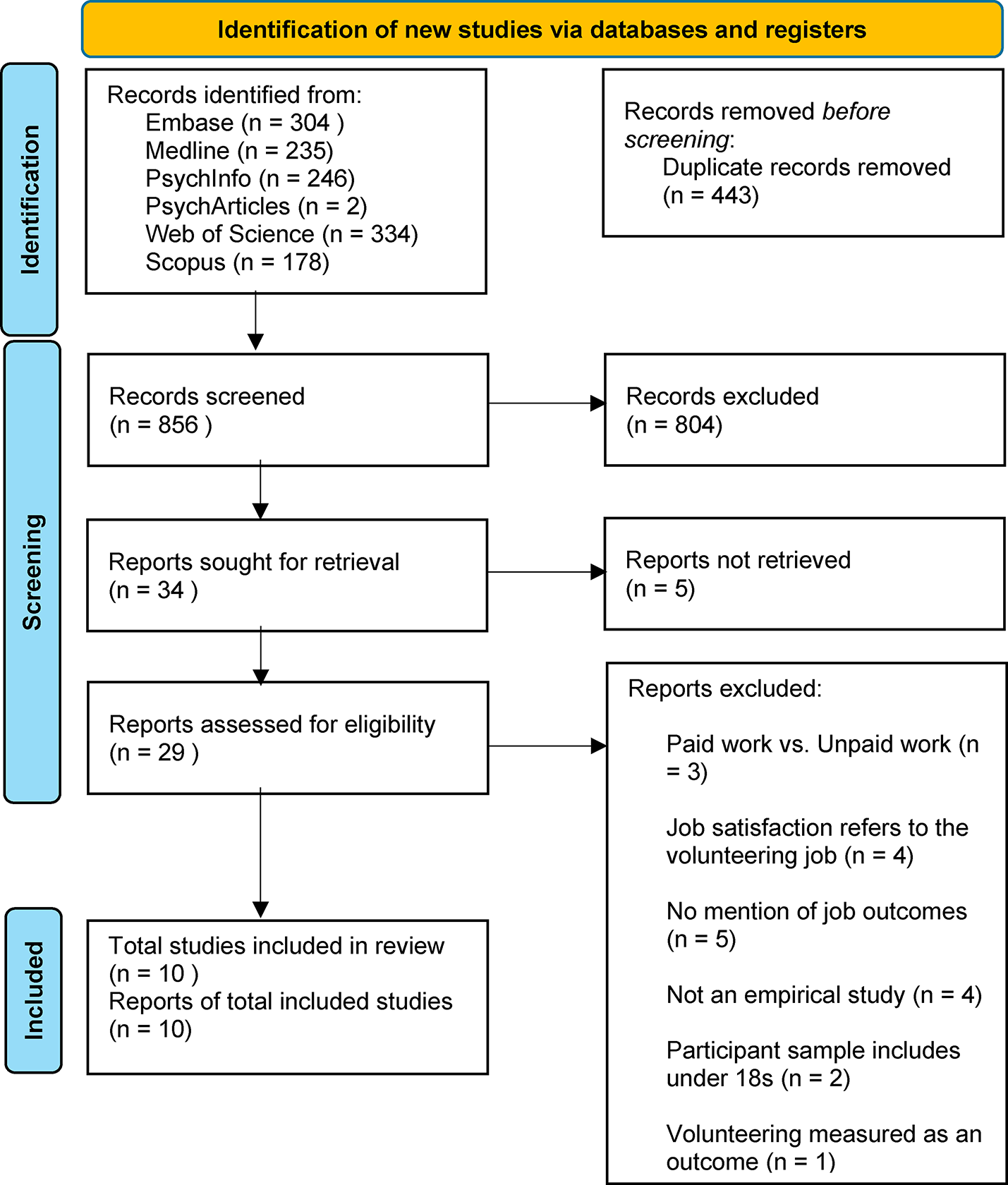What is the impact of volunteering on job satisfaction and job performance?
Published in Sustainability
When we think about volunteering, we often imagine people helping at food banks, mentoring young people, or planting trees in their local park. What may not spring to mind immediately is how volunteering connects back to the workplace. Yet, more and more companies are investing in corporate volunteering programs (e.g. opportunities for employees to volunteer through employer-sponsored initiatives).
But does this kind of volunteering make a difference at work? Does giving time to help others translate into feeling happier or performing better on the job? Our new Systematic review of research suggests that it just might, though the relationship is more complex than it first appears.
Why study volunteering at work?
Volunteering is already well recognised for its personal benefits. Studies show it can boost mental health, reduce stress, and foster a sense of purpose and connection. But while the link between volunteering and personal wellbeing has been studied extensively, its impact on work outcomes, like job satisfaction (how happy people are at work) and job performance (how well they do their tasks) hasn’t been explored thoroughly.
Given that many organisations now encourage employees to volunteer as part of their corporate social responsibility (CSR) strategies, understanding these workplace effects matters. If volunteering helps employees feel more engaged, more satisfied, and even more productive, it’s not just good for society, it’s good for business.
What did we do in our study?
To find answers, researchers looked across six major academic databases to identify studies that examined the relationship between corporate volunteering and job-related outcomes among working adults.
In total, ten relevant studies were identified. Together, these studies provided a window into how volunteering interacts with job satisfaction and performance, and what factors might shape those effects.
What did our study find?
- Job satisfaction: 86% of the studies reported a positive relationship between volunteering and job satisfaction. In other words, employees who volunteered tended to feel happier in their jobs.
- Job performance: The evidence here was more mixed with 57% of studies reporting a positive association. Importantly, performance benefits didn’t increase endlessly with more volunteering. Instead, an S-shaped pattern emerged. Moderate levels of volunteering seemed to boost performance, but too little or too much had weaker or negative effects.
Other key factors also influenced the outcomes:
- CSR attitudes: If employees believed volunteering was motivated mainly by team-building or company image, the positive effects were weaker. Authentic, driven by community-needs volunteering mattered more.
- Skill alignment: When volunteering tapped into employees’ professional skills, it was more likely to improve both satisfaction and performance.
- Intensity of participation: Frequency and depth of involvement shaped the outcomes, too much could create strain, while the right balance fostered growth.
Why might volunteering help at work?
Several psychological theories help explain these findings.
- Social Exchange Theory suggests that when employees feel supported by their employer (for instance, by being given time to volunteer), they respond with greater commitment and satisfaction.
- Organisational Support Theory suggests that when employees feel their volunteering efforts are genuinely valued by their company, they may experience a greater sense of value and belonging.
- Job Demands-Resources (JD-R) model offers another angle: volunteering can act either as a resource or a demand, depending on its intensity and the organizational context. As a resource, volunteering can provide skills, social connections, and personal growth that help balance job demands, boost engagement and performance. However, if volunteering becomes too demanding, it may add strain instead o support.
So, as the S-shaped curve shows, balance is essential. Too much volunteering may pull employees away from core responsibilities or create stress, tipping it from a resource into a demand.
What does this mean for organisations?
The review offers several practical lessons for companies and HR professionals:
- Design meaningful programs. Volunteering works best when employees see it as genuine and socially valuable, not just a corporate PR exercise. Communicating purpose clearly is crucial.
- Align volunteering with skills. Giving employees opportunities to use and develop their professional skills through volunteering not only benefits the community but also enhances satisfaction and workplace performance.
- Mind the balance. Moderate levels of involvement appear optimal. Too little won’t generate benefits, while too much could backfire. Companies should help employees find the sweet spot.
- Foster social connection. Volunteering often builds bonds between employees, which in turn strengthens morale and teamwork back at work. Encouraging group volunteering opportunities can amplify this effect.
What next?
This systematic review is the first to focus specifically on volunteering’s impact on job satisfaction and job performance. While the evidence points to clear benefits, it also highlights complexity. Future research will need to:
- Test these relationships in more diverse contexts (most existing studies come from high-income countries).
- Explore new forms of volunteering, such as remote volunteering in our increasingly hybrid and digital workplaces.
- Use longitudinal designs (tracking people over time) to untangle cause and effect more clearly.
Volunteering is often seen as something we give outward, a way to help others. But as this review shows, it also gives back, to employees and the organisations they work for. When done well, corporate volunteering creates a virtuous circle: employees feel more satisfied, performance can improve, and communities benefit too.
The challenge for companies is to harness these benefits thoughtfully. Volunteering should not feel forced, superficial, or overwhelming. Instead, it should be authentic, purposeful, and balanced. Get that right, and volunteering becomes more than a feel-good initiative, it becomes a powerful tool for employee wellbeing and organisational success.
So, the takeaway is clear: thoughtfully designed corporate volunteering programs can do more than just serve communities, they can also enrich employees’ work lives.
Follow the Topic
-
Discover Psychology

This is an international, open access journal that publishes research in behavioral sciences and related fields, including health, environment, neuroscience, business, economics, ergonomics, linguistics, and education.
What are SDG Topics?
An introduction to Sustainable Development Goals (SDGs) Topics and their role in highlighting sustainable development research.
Continue reading announcementRelated Collections
With Collections, you can get published faster and increase your visibility.
Mental Health and SDGs: Examining Interrelationships Between Mental Health and Agenda 2030
Mental health is integral to achieving the Sustainable Development Goals (SDGs), as it intersects with all the global targets for Agenda 2030. The inclusion of mental health within Agenda 2030 reflects its importance for achieving global well-being and equity. However, the complex relationships between mental health and the SDGs are often underexplored. For instance, poor mental health can hinder educational attainment, economic productivity, and resilience to environmental crises, while systemic inequities, climate change, and conflict exacerbate mental health challenges globally.
Despite growing global commitments, the integration of mental health into development agendas remains fragmented. Research is often siloed, focusing on either mental health outcomes or SDG targets, rather than exploring their interdependencies. Furthermore, there is limited understanding of how mental health interventions can accelerate SDG achievements or how progress on the SDGs can promote mental well-being. Addressing these gaps is essential to building inclusive, sustainable communities where mental health and development reinforce one another.
This collection aims to provide a platform for interdisciplinary research that examines the interrelationships between mental health and the SDGs. We welcome studies that investigate how mental health issues influence progress on the SDGs and how development efforts can address mental health disparities. This collection will offer critical insights for policymakers, practitioners, and researchers working to integrate mental health into global development strategies.
Key Themes Include (but are not limited to):
• Mental Health and Overall Health and Well-Being: Exploring mental health as a core component of health and well-being, including the integration of mental health services into primary healthcare.
• Educational Outcomes and Mental Health: Investigating the effects of mental health on learning, school attendance, and academic performance, and vice versa.
• Gender Equality and Mental Health: Examining the mental health implications of gender disparities, violence, and empowerment.
• Climate Change and Mental Health: Assessing the psychological impacts of climate-related events and the role of mental health in building climate resilience.
• Mental Health Inequities and SDG Progress: Exploring how disparities in access to mental health care affect progress on the SDGs, especially for marginalized groups.
• Resilience and Sustainable Development: Identifying protective factors and community-based strategies that enhance mental health and promote sustainable development.
• Digital Innovations and Mental Health in SDG Achievement: Evaluating the role of technology in addressing mental health challenges within development contexts.
• Mental Health Policy and the SDGs: Analyzing policies that integrate mental health into national and international development agendas.
• Youth Mental Health and SDGs: Investigating the intersection of youth mental health with education, employment, and civic participation.
• Intersectionality in Mental Health and SDGs: Exploring how intersecting identities (e.g., age, gender, socio-economic status, ethnicity) influence mental health outcomes and development goals.
Keywords: Mental Health and Sustainable Development Goals; Global Mental Health and SDGs; Mental Health Equity; Climate and Mental Health; Resilience and Well-being; Mental Health Policy and Advocacy; Education and Mental Health; Gender and Mental Health; Vulnerable Populations; Interdisciplinary Development and Mental Health.
This Collection supports and amplifies research related to all the SDGs.
Publishing Model: Open Access
Deadline: Jun 30, 2026
Psychological Capacities for Mental Health and Wellbeing in the Era of Climate Change and Covid-19 Aftermath
The COVID-19 pandemic has greatly altered the way we live, work and socialise and continues to impact global mental health and wellbeing. Post the COVID 19 pandemic, and in the context of increasing environmental disasters due to climate change, there is a growing importance to be prepared and effectively deal with future adversities and threats. In this respect, understanding aspects of positive psychological capacities that can access and develop individual and community strengths are gaining importance. There is a growing body of evidence from positive psychology on a broader set of positive attributes/ resources such as self-efficacy, resilience, hope, optimism, sense of coherence, autonomy, resourcefulness, identity, hope, religiosity/spirituality and life valuation as critical indicators of mental health and wellbeing.
Positive psychology has inspired many fields of research including education, health, workplace and sports, to better capture strengths and capacities that can be measured and developed to improve, health, wellbeing and productivity. However, a significant pitfall of this research has been in discipline silos, published in discipline specific journals with limited access to researchers from other fields, impairing cross-disciplinary learnings across fields. For example, empirical evidence from the field of positive organisation behaviour has suggested psychological capital (PsyCap) as an higher-order construct that includes hope, self-efficacy, resilience and optimism to be associated with workplace burnout, wellbeing and satisfaction.
This collection will provide a platform for researcher across the field of education, health and workplace to publish articles related to measuring and developing psychological capacities to improve mental health and wellbeing. This collection aims to promote exchange of ideas and knowledge between disciplines to better understand, measure and develop psychological capacities to successfully address mental health concerns and wellbeing in the era of climate change and the COVID-19 aftermath.
Keywords: Psychological capacities, Resilience, Positive Psychology, Mental health and Wellbeing.
Publishing Model: Open Access
Deadline: Jun 30, 2026





Please sign in or register for FREE
If you are a registered user on Research Communities by Springer Nature, please sign in